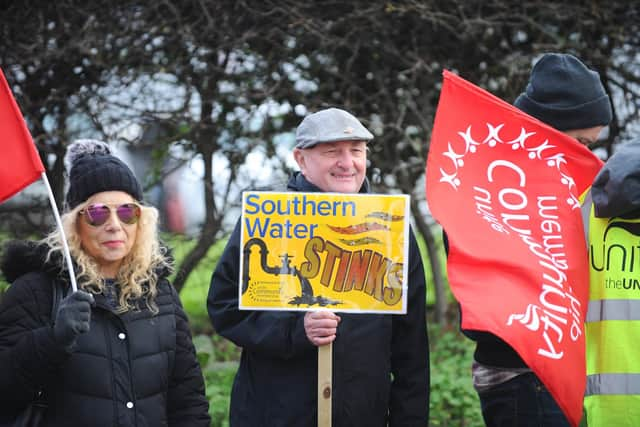Southern Water says number of storm overflows 'still isn’t good enough' after Environment Agency stats released
and live on Freeview channel 276
Event duration monitoring (EDM) figures released by the agency on Friday, March 31 show that the water services provider was responsible for fewer spills in 2022 than in 2021. However, this was ‘largely’ due to dry weather rather which saw a national reduction last year, according to the environment agency.
Environment Agency executive director John Leyland said: ‘The decrease in spills in 2022 is largely down to dry weather, not water company action. We want to see quicker progress from water companies on reducing spills and acting on monitoring data. We expect them to be fully across the detail of their networks and to maintain and invest in them to the high standard that the public expect and the regulator demands.’


Advertisement
Hide AdAdvertisement
Hide AdEnvironment minister Rebecca Pow added: ‘The volume of sewage being discharged into our waters is unacceptable and we are taking action to make sure polluters are held to account.
‘By bringing in comprehensive monitoring – up from just 7 per cent in 2010 to the most extensive level ever now being at 91 per cent – this government and its regulators have enabled the extent of sewage discharges to be revealed, so that we are better equipped to tackle this challenge.
‘We have set the strictest targets ever on water companies to reduce sewage discharges, and are requiring them to deliver the largest infrastructure programme in their history – an estimated £56bn in capital investment over the next 25 years, driving more improvements. This is the game-changing action that will make the difference we need.’
Southern water has fitted 98.5 per cent of its storm overflows with monitoring devices in line with government instructions for water companies to monitor 100 per cent of the emergency release valves by the end of 2023.
Advertisement
Hide AdAdvertisement
Hide AdThe total number of monitored Southern Water spill events in 2022 was 16,688, compared to 19,077 in 2021, a decrease of 14.3 per cent. Nationally, there was a 19 per cent decrease in sewage spills. The data shows a one per cent increase in Southern Water overflows which did not spill at all.
Southern Water director of environment and quality Toby Willison said: ‘Today’s official Environment Agency data for 2022 shows a fall in overall storm overflow activity and we are already exceeding the government’s expectations for spills per overflow. However, we know this still isn’t good enough and are working extremely hard to drive down storm overflows.
‘Following the success of small-scale, innovative nature-based and engineering solutions which slow the flow of surface water into our sewer system, we are now looking to roll these out more widely over the next two years.
‘Larger construction projects have also made a big difference, including a new 11km sewer pipe in Brighton, which along with two associated pumping stations and a wastewater treatment works, ensures that the 95 million litres of wastewater from Brighton and the surrounding areas is fully treated. Our digital monitors now cover 98.5 per cent of our outfalls, and will hit 100 per cent by this time next year. We will continue to report our progress in a transparent and open way.’
Advertisement
Hide AdAdvertisement
Hide AdWater minister Rebecca Pow was recently asked by Liberal Democrat MP Tim Farron to provide data on the number of times water companies had breached their storm overflow limits in 2021, 2022 and 2023.
In her response, the minister pointed to figures collected in a 2021 National Compliance Assessment, which show that Southern Water was responsible for 77 ‘non-compliances’ in 2021 and 195 in 2022 – an increase of 153 per cent.
She added: ‘We will not let companies get away with illegal activity and where breaches are found, we will not hesitate to hold companies to account. Since 2015, the Environment Agency have concluded 58 prosecutions against water and sewerage companies securing fines of over £142m. We recently announced water companies will face higher penalties that are quicker and easier to enforce.’
Of Southern Water’s 195 breaches last year, 67 related to unauthorised discharges linked to rainfall conditions. However, the water company – which covers homes in Kent, Sussex, Hampshire and the Isle of Wight – claims the data fails to account for the number of visits by regulators and the ‘nature of instances.’
Advertisement
Hide AdAdvertisement
Hide AdA Southern Water spokesperson added: ‘This data is not an official record of pollution incidents and should not be used to compare performance between water companies. The data does not represent actual or potential overflow permit breaches alone; instead the data applies to a wide suite of actions agreed with the Environment Agency, most following site meetings, to ensure we meet our permit requirements.
‘This includes areas like general management, telemetry, access to sample points and signage. Without the context of the number of inspection visits per company, the numbers are not comparable.’
Earlier this year, Southern Water announced that dual-service customers will see their bills increase by 9.4 per cent in 2023. An average annual bill for water and waste services will go from £401 to £439.
A statement from the Environment Agency said: ‘Storm overflows are a safety valve designed to release excess storm water from the sewerage system into rivers or the sea during periods of rainfall and/or snowmelt to ensure they are not overwhelmed. Water companies should only do this under strictly permitted conditions. EDM devices provide essential information about storm overflow use, helping to hold water companies to account. The Environment Agency shares public concerns around storm overflows and is calling for urgent improvements in storm overflow maintenance, management and investment by water companies.’